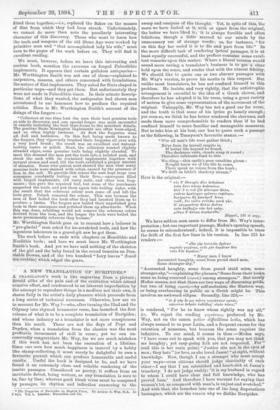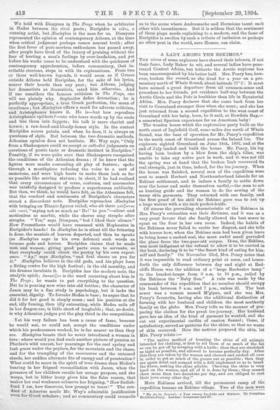A NEW TRANSLATION OP EURIPIDES.*
A TRANSLATOR'S work is like engraving from a picture ; devoid alike of the pain and of the exultation which attend creative effort, and condemned to an inherent imperfection by the attempt to reproduce things in a medium not their own, it shares fully in the artist's daily pleasure which proceeds from a long series of technical successes. Otherwise, how are we to account for Mr. Way ?—who, after turning the Iliad and. the Odyssey into rhymed hexameter verse, has launched the first volume of what is to be a complete translation of Euripides ; and whose industry as a translator is not more conspicuous than his merit. These are not the days of Pope and Dryden, when a translation from the classics was the most profitable investment of skill in verse ; yet we can un- reservedly congratulate Mr. Way, for we are much mistaken if this work has not been the recreation of a lifetime. Since one sees how much happiness is insured by a hobby like stamp-collecting, it must surely be delightful to own a favourite pursuit which can produce honourable and useful results. Useful the book is designed to be, and we have found it an extremely close and reliable rendering of the iambic passages. Considered as poetry, it suffers from an inevitable defect, being written, as any translation is sure to be, line by line; whereas good blank verse must be composed by passages, its rhythm and inflection answering to the * Tho Tragedies of Ewripicles in English Verse. By Arthur S. Way, M.A. In 3 Tols, Vol. 1. London: Macmillan and Co. sweep and compass of the thought. Yet, in spite of this, the more we have looked at it, with or apart from the original, the better we have liked it; it is always forcible and often felicitous, though a little marred to our minds by the unnecessary use of strange words ; as, for instance, "for on this day her weird it is to die and part from life." In the more difficult task of rendering lyrical passages, it is at least equally successful, and the preface contains some excel.. lent remarks upon this matter. Where a literal version would sound mere raving, a translator's business is to get a clear hold upon the souse, and render that with the utmost fidelity. We should like to quote one or two obscure passages with Mr. Way's version, to prove his merits in this respect. But unlike most translators, he has not confined himself to this problem. He insists, and very rightly, that the antistrophie arrangement is essential to the idea of a Greek chorus, and therefore he has adopted it in his verse, using a great variety of metres to give scene representation of the movement of the original. Unhappily, Mr. Way has not a good ear for verse, and the truth is that some of his lyrics go lamely enough ; yet even so, we think he has better rendered the choruses, and made them more comprehensible to readers than if he had confined himself to more familiar and manageable measures. But to take him at his best, one has to quote such a passage as the following, in Tennyson's favourite stanza :— "O'er all man's life woes gather thick;
Ne'er from its travail respite is. If better life beyond be found,
The darkness veils, clouds wrap it round ;
Therefore infatuate-fond to this We cling,--this earth's poor sunshine gleam :- Nought know we of the life to come,
There speak no voices from the tomb ; We drift on fable's shadowy stream."
Here is the original:-
" vas 8' OStivrpbs flies avepL67rwP
Nallt WffrL TZVC.0 aVeGrallelS.
rri roiCi7lv ca(ATEpov etAXo, olcdros aliViCrXWP lorTEL PECIACUS. IlltIrEpO.Yre5 7eaeeseEe' PTES IS11 TODTO OTIASEI gaTa. Y arcipocr6v7p 4AAou Storm) Kok luractILy TrOV &Kb yaias.
pitiOots 8' 4A.Aws cbfAuccrOa." Hippol., 191 et seqq.
We have seldom seen cause to differ from Mr. Way's inter.- pretation ; but one important passage, Aledea's opening speech, he seems to misunderstand ; indeed, it is impossible to trace
the drift of the first few lines in his version. In line 215 he renders :— " no/iNoin OpliTWV GrElAYObS yeyiiiras, Toeq /kb kudTon, aro Tan VI/ Or/patois?'
"Many men I know
Accounted haughty, some from proud staid men, Some stranger-shy."
"Accounted haughty, some from proud staid mien, some stranger-shy,"—explaining the phrases," Some from their looks, some as being reserved (eefeyee) among strangers." But surely Medea means, not that there are two ways of discerning pride,. but two of being eE(.444,—by self-seclusion, the Eastern way, or being overbearing in public as a Greek might be. This, involves no awkward ellipse. Secondly, line 228,— yap ey p.oi wcipra -yryydparceLp KaAtos, Kebew-Tos ?tpkpaw ixiElOnx" obp.bs wdtris," is rendered, "For he to know whom rightly was my all," &c. We reject the reading yevyLazzq, preferred by Mr. Way, not on the canon potior difficillima lactic, which has always seemed to us poor Latin, and a frequent excuse for the retention of nonsense, but because the sense requires the infinitive. To our mind, it comes in thus :—Medea says, "I have come out to speak with you, that you may not think
me haughty ; yet easy-going folk are not respected. For (and this is her main point) "Justice sits not in the eyes of men ; they hate" (or love, as she loved Jason) "at sight, without knowledge. Now, though I am a stranger who must accept
your ways—even citizens should judge charitably of each other—I say that I am astonished and heart-sick at Jason's treachery. I do not judge rashly; 'it is my husband in regard to whom I could have dear and full knowledge, who has
proved base.' And therefore I have warrant for saying that woman's lot, as compared with man's, is unjust and wretched." And with that, she launches into one of the long disputatious harangues, which are the reason why we dislike Euripides.
We hold with Dionysus in The Frogs when he arbitrates in Hades between the rival poets ; Euripides is 040‘, cunning artist, but Asebylus is the man for us. Dionysus represented the opinion of contemporary Athens, at the time when critical judgment perhaps comes nearest truth ; after the first fever of post-mortem enthusiasm has passed away, after people have tired of the luxury of praising without the fear of hurting a man's feelings by over-laudation, and yet before his works cease to be understood with the quickness of contemporary apprehension, before commentary, that in- evitable cicerone, steps in with its explanations. From two or three well-known legends, it would seem as if Greece outside Athens held Euripides, for the sake of his lyrics, nearer their hearts than any poet ; but Athens, judging her dramatists as dramatists, rated him otherwise. And if one considers the famous criticism in The Frogs, one will see plainly why. Sophocles defies detraction ; he is perfectly appropriate, a true Greek perfection, the mean of excellence ; but Aschylus offere a mark for adverse criticism, and Aristophanes knows it. He is—but how reproduce Aristophanic epithets P—one who tears words up by the roots and ties them into faggots; his talk is mere chariot and horses; a raw-head-and-bloody-bones style. In the contest Euripides scores points, and when he does, it is always on questions of style. But between the two dramatic methods, Athenian opinion does not hesitate. Mr. Way says, "Only from a Shakespeare could we accept ex cathedra judgments on questions of poetic taste or dramatic instinct in Euripides." Possibly, if we were quite sure that Shakespeare recognised the conditions of the Athenian drama ; if he knew that the figures wore masks concealing all play of feature; spoke through a mouthpiece reducing the voice to a sort of monotone, and wore high boots to make them look as far as possible like moving statues ; in short, if he had realised that every circumstance of verse, costume, and accessories was carefully designed to produce a superhuman sublimity. But then, we think, he would have felt, as the Athenians felt, that the conduct and sentiments of Euripides's characters struck a discordant note. Euripides reproaches 2Eschylus with bringing on Titanic figures veiled, who sit there ypi4ovren;' oa; TOUTI, "saying not so much as Bo!' to you"—silent and motionless as marble, while the chorus sing strophe after strophe. "Yes," says Dionysus, "but I liked their silence." How Prometheus would have reasoned with Hephaastus in Euripides's hands ! In 2Eschylus he is silent till the fettering is done, the menials of heaven departed, and then he speaks (as 2Eschylus says in his own defence) such words as became gods and heroes. Euripides claims that he made men and women, giving good parts even to servants, so that everybody could check the poetry by his own experi- ence. "Ay," says 2Eschylus, "and foul shame on you for it." iffilschylus believes in the old gods, and his plays form a fitting centre for the high festival ; in the old morality, and his dramas inculcate it. Euripides has the modern note, the analytic spirit; /3etcroadCen4 is the word recurring about him in The Frogs ; he wants to put everything to the question. But he is pouring new wine into old bottles ; the character of Jason may be a fine study in psychology, but it lacks the essential, dignity. To forsake Medea is base ; to argue that he did it for her good is simply mean ; and his position at the end, idly fuming, then idly entreating, while Medea sails off in her dragon-car, is little short of laughable ; that, no doubt, is why Athenian judges put the play third in the competition.
Yet his very failure has been a cause of fame, because he would not, or could not, accept the conditions under which his predecessors worked, he is far nearer us than they are. Aschylus boasts that he never introduced a woman in love : where would you find such another picture of passion as Phmdra's wild unrest, her yearnings for the cool spring and lush grass under the poplars, for the mountain and the chase, and for the trampling of the racecourse and the untamed steeds, her sudden alternate fits of energy and of prostration What could be more in the spirit of true drama than Medea's bearing in her feigned reconciliation with Jason, when the presence of her children recalls her savage purpose, and she weeps, but in bitter irony gives him the false reason, that makes her real weakness subserve her feigning, "How foolish- fond I am, how timorous, bow prompt to tears !" The con- duct of Admetus needs Mr. Way's admirable justification even for Greek scholars ; and no commentary could reconcile us to the scene where Andromache and Hermione taunt each other with incontinence. But it is seldom that the sentiment of these plays needs explaining to a modern, and the fame of Euripides is swollen by such a tribute of imitation as perhaps no other poet in the world, save Homer, can claim.







































 Previous page
Previous page